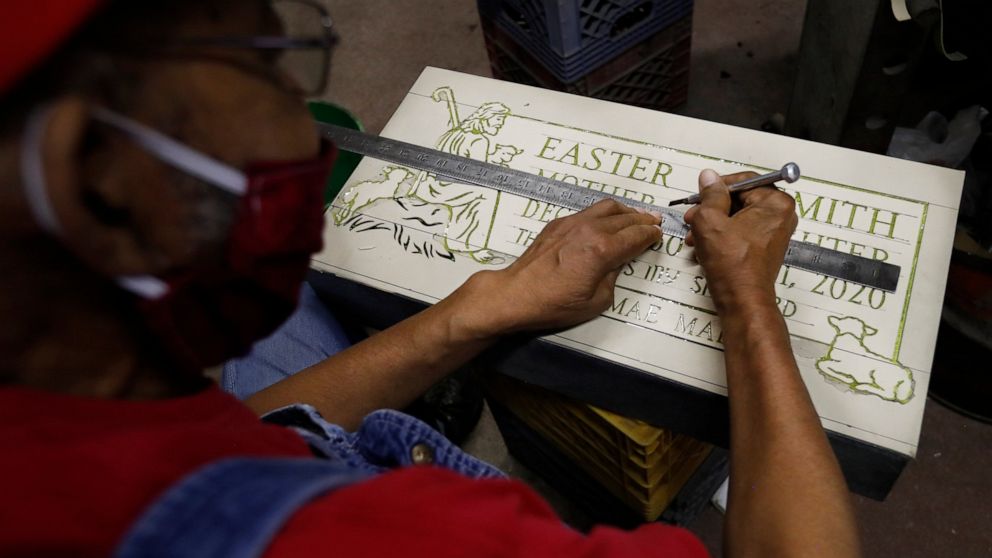Violence at work
Violence at work The slogan, “Be 4 You Go, See Elmo,” was coined by the original Elmo’s Tombstone Service owner, Robert Williams, when the Chicago business started more than 50 years ago
By
CHARLES REX ARBOGAST Associated Press
September 6, 2020, 2:12 AM
3 min read
CHICAGO — Elmo’s has been making tombstones on the South Side of Chicago for more than half a century, hand-carving grave markers for the bereaved families of everyone from local celebrities to victims of the gang violence that has become a hallmark of that part of the city.
“Be 4 You Go, See Elmo,” the catchphrase coined by Elmo’s Tombstone Service’s original owner, Robert Williams, still graces the small shop’s awning. The line underneath, “Tombstones made while you wait,” might be the final hook that gets through the door of the Black-owned business.
Like its counterparts throughout the state, Elmo’s had to close briefly early on during the coronavirus pandemic — deemed nonessential despite the high numbers of COVID-19 cases and deaths in Chicago, particularly on the South Side. The pandemic has slowed funerals and cemetery operations, but it’s current owner, Hosea Knox, said Friday that Elmo’s should be fine.
“It’s going really well, I have sold more expensive stones this year than the year before,” he said, noting that it was too soon to tell whether the uptick in business was due to the pandemic.
Knox’s industrial arts education at Grambling College — now Grambling State University — led him to work for Williams more than four decades ago. Knox and his wife, Bobbie, bought the business from Williams in 1987.
“It was an opportunity to stop working for someone else,” Knox said.
Knox, 81, lost his wife to cancer in 2012. He inscribed “WIFE, MOTHER, GRANDMOTHER, IN GOD’S HANDS” on her blue pearl granite stone, and Bobbie remains listed on his business cards.
The process of transcribing begins as a collaboration between the deceased’s family and Knox. Once lettering and design are agreed upon, Knox and assistant Leon Brown begin transforming a standard stone into a piece of memorial art.
An average stone can cost $700 to $2,000.
Knox and Brown take pride in distinguishing themselves from the modern “computerized laser” cut, a technique that Knox claims is just a “skin” cut that will fade over time.
“It is just like a photograph, it is not cut in there deep,” Knox said, “When I cut a stone, it is down in there and will withstand the weather.”
The South Side has seen more than its share of tragedy, including its many gang-related shootings and now the pandemic.
Roebuck “Pops” Staples, patriarch of The Staples Singers, brought the family to Knox’s shop to select his monument before he died in 2000. Staples was buried in the Oak Woods Cemetery along with journalist/activist Ida B. Wells, nuclear scientist Enrico Fermi, Olympic champion Jesse Owens and Chicago Mayor Harold Washington.
Knox has thought about his own stone.
“I will have to eventually do it, my name, birthday, deceased date, and I might put a little thing that says, ‘Elmo’s Tombstone Service’ on the bottom.”
